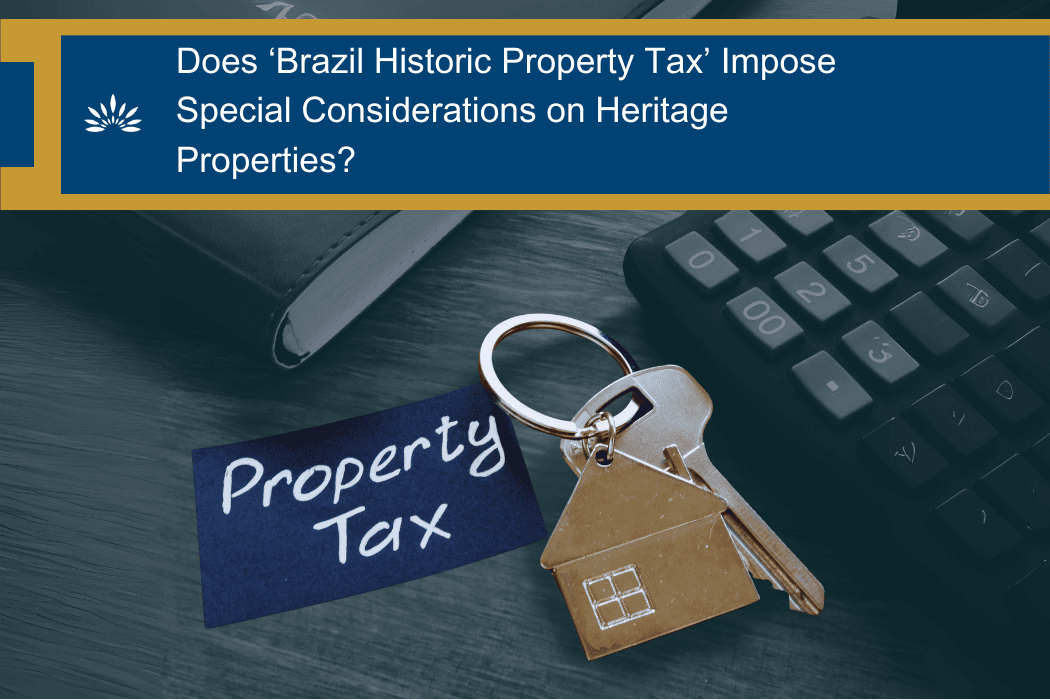Preserving the Past, Protecting Your Investment
Curious about how tax obligations shift when owning a property steeped in Brazil’s storied past? In this guide, we untangle the nuances of heritage listings, government incentives, and preservation regulations—so you can confidently weigh the pros and cons of investing in a culturally significant gem. Discover how tax breaks might balance out the extra care required to maintain these architectural treasures.
Introduction: Why Heritage Properties?
Picture yourself in a bustling café in Ouro Preto, Minas Gerais. Two friends sit nearby, engrossed in a vibrant discussion about a remarkable discovery they made during their property search. One friend recently found an old colonial real estate property in the heart of this UNESCO World Heritage Site. The building’s ornate balconies, hand-painted tiles, and strikingly preserved façade immediately stole their attention. However, a pressing question emerged: Does this heritage property come with different property tax rules? “Could there be a property tax hike on historical buildings?” the friend wonders. “Or are there property tax incentives that might offset any extra expenses?”
Their conversation highlights a common dilemma in Brazil’s cultural heritage real estate market. Potential property owners frequently ask whether historic preservation laws raise taxes or, alternatively, provide tax relief and other brazil tax incentives. After all, owning a heritage property involves more than simple ownership; it means contributing to property preservation and embracing the responsibility of protecting a slice of Brazil’s architectural identity. In this comprehensive guide, we’ll explore how Property Tax interacts with historic preservation, walk through the brazil tax incentives that might be available, and discuss essential steps to consider when buying or maintaining a heritage property. We’ll delve into real-life examples, practical tips, and relevant laws so that, by the end, you’ll feel confident about investing in one of Brazil’s culturally significant gems.
“Could there be a property tax hike on historical buildings?”
If you’ve ever asked yourself this, you’re not alone. Balancing the charm of colonial architecture with modern taxation is a nuanced challenge—but one that can pay off with the right planning.

Understanding the Foundations of Property Tax in Brazil
When we talk about Property Tax in urban areas, we usually refer to the well-known IPTU (Imposto Predial e Territorial Urbano). Each Brazilian municipality enforces its own IPTU, which it calculates based on the property’s venal value (assessed value). Whether you plan to acquire a standard house or a heritage property, you’ll need to consider IPTU as part of the ownership cost.
IPTU Basics
IPTU is mandatory for property owners within urban boundaries. Municipalities determine annual rates, which can vary wildly between cities such as São Paulo, Salvador, and Porto Alegre. Because local governments handle IPTU independently, a buyer could encounter notably different tax scenarios even for properties of similar sizes or market values.
Enter Historic Preservation
If you’re thinking about purchasing a heritage property, you’ll need to understand how historic preservation laws intersect with IPTU. Buildings recognized for their cultural heritage may be exempt from certain municipal fees or qualify for property tax incentives (such as discounted IPTU rates). However, you might also face a property tax hike if you fail to follow local regulations aimed at property preservation. This interplay makes due diligence critical.
The Role of Heritage Status in Property Tax
When a building is designated as part of a cultural heritage area—like a UNESCO World Heritage Site—specific regulations and conditions often apply. You might encounter extra steps or enjoy distinct tax relief measures. Let’s break down how owning a heritage property can impact the way you pay Property Tax.
Possible Tax Breaks: Many Brazilian municipalities encourage historic preservation by offering property tax incentives. These range from partial IPTU exemptions to streamlined application processes for brazil tax incentives that help with restoration costs.
Potential Extra Costs: On the flip side, local authorities could enforce additional requirements for property preservation. While not a direct property tax hike, these costs can feel like an extra tax burden if you must pay for artisan labor or expensive restoration supplies.
Government Incentives for Preserving Historic Properties
Many property owners of older buildings worry about a “tax overload.” Yet Brazil’s multi-layered government structure—federal, state, and municipal—also provides various forms of tax relief and brazil tax incentives for owners who commit to historic preservation. These can significantly ease the financial obligations associated with property preservation.
Tax Incentives and Grants: If you own a heritage property officially listed under municipal or federal registries, you may qualify for IPTU reductions or even complete exemptions. Some cities also offer financial grants to facilitate large-scale restorations.
Renovation Tax Credits: Certain localities provide credits or refunds to subsidize restoration efforts. If the property stands in an area recognized as a UNESCO World Heritage Site—like Ouro Preto or parts of Salvador—your chances of obtaining these property tax incentives may increase.
Ordinary Real Estate vs. Heritage Property
Purchasing or owning a heritage property differs in key ways from acquiring a standard real estate property. Both involve a property search, negotiations, and eventual paperwork. But a building with historic preservation status requires more meticulous planning and compliance.
Additional Permits and Reviews: When dealing with cultural authorities, owners often need specialized permits for renovation, repainting, or structural changes. Failing to secure these approvals can jeopardize property tax incentives or invite fines.
Costs Beyond Taxation: It’s essential to note that property owners of older buildings frequently incur higher maintenance costs. Achieving historically correct restorations may demand expensive materials and skilled artisans.
Real-Life Example: A Colonial Home in Salvador’s Historic District
Imagine you find a colonial-era house in Pelourinho, a famed district in Salvador that’s part of a UNESCO World Heritage Site. The property captures the essence of Brazil’s fusion of Portuguese and African influences—vibrant colors, iron-laced balconies, and meticulously carved doors.
Local authorities might offer partial IPTU exemptions or even direct funding for preserving the original façade. In return, you must follow stringent property preservation guidelines: paint colors must stay historically accurate, and any structural renovations require specialized oversight. If you fail to honor these guidelines, you could face a sudden property tax hike or lose your eligibility for brazil tax incentives.
Key Legal Framework for Brazilian Historic Property Taxation
Brazilian preservation policies involve a tapestry of federal, state, and municipal laws. Understanding this structure is crucial for property owners exploring a heritage property purchase.
IPHAN Oversight: IPHAN (Instituto do Patrimônio Histórico e Artístico Nacional) is Brazil’s federal authority on historic preservation. Failure to secure approval for significant alterations can lead to legal disputes, loss of tax relief, and possible penalties.
Municipal Heritage Councils: On a municipal level, heritage councils administer property preservation rules, distribute property tax incentives, and set forth additional guidelines.
Renovation Requirements and Tax Benefits: A Step-by-Step Overview
Transforming a century-old building into a beautifully restored gem requires more than passion; it demands strategy. To help you maximize property tax incentives and avoid missteps, let’s outline a step-by-step approach:
- Confirm Heritage Status: Check if the property is listed under local or federal heritage registries.
- Assemble the Right Team: Partner with architects, contractors, and attorneys experienced in historic preservation.
- Draft a Compliant Restoration Plan: Prepare a detailed proposal that respects the building’s cultural heritage.
- Secure Permits and Approvals: Submit your plan to IPHAN or municipal councils for authorization.
- Explore Available Tax Relief: Investigate local and federal brazil tax incentives to lower your costs.
- Track All Expenses: Keep records of every purchase and restoration action for compliance.
- Maintain Open Communication: Stay in touch with heritage authorities if your plans evolve.
Regional Variations: How Location Affects Historic Property Tax
Because each Brazilian city interprets and enforces historic preservation policies differently, the location of a heritage property plays a major role in determining how Property Tax works.
São Paulo: The city occasionally grants property tax incentives for buildings in culturally significant districts. However, owners may face strict guidelines for property preservation.
Rio de Janeiro: Neighborhoods like Santa Teresa and Lapa brim with historical architecture. IPTU discounts or renovation grants may be available, though non-compliance triggers heavy penalties.
Minas Gerais: Towns like Ouro Preto and Diamantina, recognized by UNESCO, often offer IPTU discounts for colonial or baroque structures, with correspondingly tight restoration rules.
Bahia: Salvador’s Pelourinho extends partial/full IPTU exemptions for façade preservation. Unauthorized modern additions can prompt a property tax hike.
Brasília: As a planned city recognized by UNESCO, Brasília enforces modernist design standards. Non-conforming changes risk losing municipal perks or facing higher taxes.
Comparison Table: Heritage Property Tax Incentives by Region
| Location | Common Incentives | Key Requirements | Potential Pitfalls |
|---|---|---|---|
| São Paulo | Possible IPTU reductions or exemptions | Restoration of historical façades; strict local codes | Rigid requirements; potential tax hike for non-compliance |
| Rio de Janeiro | Tax credits, renovation grants | Permit submissions, preservation of iconic features | Red tape; large fines for unauthorized changes |
| Minas Gerais (Ouro Preto) | IPTU discounts, possible grants | Historically accurate materials; heritage oversight | High restoration expenses for colonial details |
| Bahia (Pelourinho) | Partial/full IPTU exemptions | Façade color codes, frequent inspections | Risk of losing incentives if guidelines are ignored |
| Brasília | Targeted modernist preservation incentives | Compliance with modernist design norms; IPHAN approval | Limited modernization options; higher taxes if non-compliant |
Financing a Heritage Property Purchase
Traditional loans apply, but banks may impose more stringent terms or request higher insurance coverage due to specialized restoration costs. On the flip side, some local programs offer low-interest loans for owners committed to preserving heritage structures.
The Appeal of Owning a Heritage Property
Despite the extra responsibilities, owning a heritage property can bring multiple rewards—both tangible and intangible.
- Cultural Stewardship: You help preserve Brazil’s legacy.
- Tourism Potential: Buildings in historical centers can transform into lucrative businesses.
- Architectural Splendor: Unique features like wrought-iron balconies or carved doors can increase property value.
- Long-Term Investment: Well-maintained heritage properties often appreciate over time.
Professional Assistance: Why It Matters
Heritage property regulations can be complex, especially if you’re new to Brazil’s historic preservation codes. Real estate agents, attorneys, and architects with heritage expertise can guide you in complying with local rules and securing tax benefits.
For real estate brokerage services, you can consult Camila Saunier International Realty. For specialized legal support, Oliveira Lawyers can help handle property law, contract drafting, and tax implications.
Preserving Brazil’s Legacy: The Personal and National Impact
Owning a heritage property isn’t solely a matter of receiving property tax incentives; it’s about embracing a commitment to uphold the nation’s cultural heritage. Whether you’re revitalizing a centuries-old colonial mansion or a mid-century modernist masterpiece, your efforts help keep these priceless edifices standing tall for future generations.
By leveraging tax relief and other brazil tax incentives, you can also make the financial aspect of historic preservation more manageable. Many government entities see heritage property owners as partners in cultural continuity.
Answering the Central Question
So, Does ‘Brazil Historic Property Tax’ Impose Special Considerations on Heritage Properties? The answer is a resounding “Yes.” Buying or owning a heritage property in Brazil involves navigating a unique set of rules. You might gain significant property tax incentives if you comply with historic preservation guidelines. Alternatively, you could encounter a property tax hike if you ignore your obligations to maintain or restore the building’s cultural heritage elements.
Diligent planning, professional advice, and a genuine commitment to property preservation are key to turning this investment into a rewarding venture.
Conclusion: Moving Forward with Confidence
Embracing a heritage property is not merely a real estate transaction; it’s a vow to respect and celebrate the architectural and cultural heritage that shapes Brazil’s identity. If you approach this process with thorough research, strong legal support, and a clear renovation strategy, you can tap into valuable tax incentives while safeguarding a treasured piece of history.
Short Summary: Historic properties in Brazil require extra steps—such as specialized permits and adherence to restoration rules—but the rewards can be substantial. With the right planning, owners can enjoy both cultural satisfaction and meaningful property tax incentives that offset the responsibility of preserving Brazil’s architectural legacy.
What’s your biggest challenge when considering a historic property in Brazil? Share your thoughts with us! Feel free to explore more about the specifics of property search, financing options, or compliance rules by visiting Camila Saunier International Realty for real estate expertise and Oliveira Lawyers for legal guidance. We’re here to help you champion the cause of historic preservation while securing an investment that could generate significant cultural and financial returns.
12 Frequently Asked Questions (FAQs)
1. How do I claim property tax incentives for a heritage property in Brazil?
You need to confirm your building’s heritage status through local or federal registries. Once confirmed, compile documents detailing your restoration expenses, renovation plans, and compliance with cultural heritage guidelines. Submit these to the relevant municipal authorities. In many cases, you can apply for partial or total IPTU exemptions.
2. Will I face a property tax hike if I don’t preserve my heritage property?
Potentially, yes. Many cities mandate strict property preservation. If you let a recognized heritage property deteriorate or if you alter it without approval, local governments can revoke property tax incentives and impose higher tax rates or penalties.
3. Can foreign nationals purchase heritage real estate property in Brazil?
Yes. Foreign nationals can buy real estate property in Brazil as long as they acquire a CPF (taxpayer ID) and follow local regulations. For historic preservation, the same obligations apply to Brazilian and foreign buyers alike.
4. What financial aid does Brazil offer for historic preservation?
Alongside property tax incentives, some municipal or state programs grant low-interest loans or direct subsidies to owners who plan significant restorations.
5. How does the UNESCO World Heritage Site designation affect property tax?
Properties in a UNESCO World Heritage Site often benefit from heightened brazil tax incentives, especially if they hold historical or architectural significance. However, owners must meet more rigorous historic preservation criteria.
6. What documents do I need when buying a heritage property?
Check for the building’s official heritage listing (federal or municipal). Obtain a thorough structural report, review any prior renovation permits, and ask about outstanding obligations tied to property preservation.
7. Are there other tax relief measures besides IPTU exemptions?
Yes, in some areas. You might find incentives covering additional municipal fees or utility connection costs. You could also receive partial reimbursements for historically accurate materials used in restoration, depending on the city’s specific brazil tax incentives policy.
8. Do I need legal assistance to handle heritage property taxes?
It’s highly advisable. Law firms experienced in Brazilian property law can help interpret complex regulations, apply for property tax incentives, and guard you against mistakes that could result in a property tax hike or legal troubles.
9. Can I modernize the interior of a heritage property?
Yes, to an extent. Local laws usually permit interior upgrades as long as you preserve significant historical elements and structural integrity. Always consult heritage councils before substantial renovations.
10. What if the property is in a poor state of repair?
Restoring a severely damaged historic building can qualify you for more substantial property tax incentives or grants, especially if the property sits in a UNESCO World Heritage Site.
11. Can I turn a heritage building into a commercial enterprise?
Often, yes. Local heritage bodies usually support adaptive reuse if it sustains cultural heritage. For instance, you might convert a colonial home into a boutique hotel or café.
12. What’s the fastest way to find out about local heritage laws and tax breaks?
Begin with your municipal heritage council or city hall. If your building falls under federal listing, contact IPHAN. Engaging a lawyer early can also streamline the process and prevent confusion.





